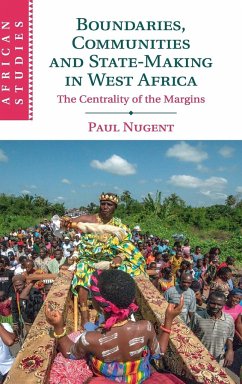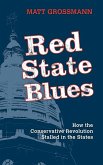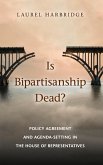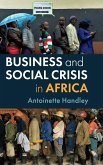Paul Nugent
Boundaries, Communities and State-Making in West Africa
Paul Nugent
Boundaries, Communities and State-Making in West Africa
- Gebundenes Buch
- Merkliste
- Auf die Merkliste
- Bewerten Bewerten
- Teilen
- Produkt teilen
- Produkterinnerung
- Produkterinnerung
By examining three centuries of history, this book shows how vital border regions have been in shaping states and social contracts.
Andere Kunden interessierten sich auch für
![Red State Blues Red State Blues]() Matt GrossmannRed State Blues87,99 €
Matt GrossmannRed State Blues87,99 €![State and Nation Making in Latin America and Spain State and Nation Making in Latin America and Spain]() State and Nation Making in Latin America and Spain80,99 €
State and Nation Making in Latin America and Spain80,99 €![Is Bipartisanship Dead? Is Bipartisanship Dead?]() Laurel HarbridgeIs Bipartisanship Dead?98,99 €
Laurel HarbridgeIs Bipartisanship Dead?98,99 €![Business and Social Crisis in Africa Business and Social Crisis in Africa]() Antoinette HandleyBusiness and Social Crisis in Africa82,99 €
Antoinette HandleyBusiness and Social Crisis in Africa82,99 €![West European Politics in the Age of Globalization West European Politics in the Age of Globalization]() Hanspeter KriesiWest European Politics in the Age of Globalization41,99 €
Hanspeter KriesiWest European Politics in the Age of Globalization41,99 €![Presidential Decision Making Presidential Decision Making]() Roger B. PorterPresidential Decision Making123,99 €
Roger B. PorterPresidential Decision Making123,99 €![Decision Making by the Modern Supreme Court Decision Making by the Modern Supreme Court]() Richard L. PacelleDecision Making by the Modern Supreme Court87,99 €
Richard L. PacelleDecision Making by the Modern Supreme Court87,99 €-
-
-
By examining three centuries of history, this book shows how vital border regions have been in shaping states and social contracts.
Produktdetails
- Produktdetails
- Verlag: Cambridge University Press
- Seitenzahl: 638
- Erscheinungstermin: 10. Mai 2019
- Englisch
- Abmessung: 235mm x 157mm x 38mm
- Gewicht: 1061g
- ISBN-13: 9781107020689
- ISBN-10: 1107020689
- Artikelnr.: 54802301
- Herstellerkennzeichnung
- Libri GmbH
- Europaallee 1
- 36244 Bad Hersfeld
- gpsr@libri.de
- Verlag: Cambridge University Press
- Seitenzahl: 638
- Erscheinungstermin: 10. Mai 2019
- Englisch
- Abmessung: 235mm x 157mm x 38mm
- Gewicht: 1061g
- ISBN-13: 9781107020689
- ISBN-10: 1107020689
- Artikelnr.: 54802301
- Herstellerkennzeichnung
- Libri GmbH
- Europaallee 1
- 36244 Bad Hersfeld
- gpsr@libri.de
Paul Nugent is Professor of Comparative African History and is located in both the the Centre of African Studies and the School of History, Classics and Archaeology at the University of Edinburgh. He has published extensively on borders, but also on Ghanaian politics, post-colonial African history and the history of South African wine. His books include African Since Independence: A Comparative History (2nd edition, 2012) and A Decade of Ghana: Politics, Economy and Society, 2004-2013 (with M. Amoah, K. Aning and N. Annan, 2015). Nugent was the co-editor of the Journal of Modern African Studies from 2012 until 2017, alongside Leo Villalón, and has since joined the editorial board of this journal. He is also the founder and chair of the African Borderlands Research Network (ABORNE).
1. Centering the margins: states, borderlands and communities; Part I. From
Frontiers to Boundaries: 2. Configurations of power in comparative
perspective: commerce, people and belief to c.1880; 3. Port cities,
frontiers and boundaries: spatial lineages of the colonial state; Part II.
States and Taxes, Land and Mobility: 4. Constructing the compound, keeping
the gate: a fiscal anatomy of colonial state-making, c.1900-40; 5. Being
seen like a state: frontier logics, colonial administration and traditional
authority in the borderlands; 6. Border regulation and state-making at the
margins: taxation, migration and contraband during the interwar years; 7.
Land, belief and belonging in the borderlands; Part III. Decolonization and
Boundary Closure, 1939-69: 8. Bringing the space back in: decolonization,
development and territoriality c.1939-60; 9. The vanishing horizon of
Senegambian unity: statist visions and border dynamics; 10. Forging the
nation, contesting the border: identity politics and border dynamics in the
Trans-Volta; Part IV. States, Social Contracts and Respacing From Below,
1970-2010; 11. Barnacle states and boundary lines: states, trade and
urbanism in the Senegambia; 12. The remaking of Ghana and Togo at their
common border: Alhaji Kalabule meets Nana Benz; 13. Boundaries, communities
and 're-membering': festivals and the negotiation of difference;
Conclusion. Boundaries and state-making: comparisons through time and
space.
Frontiers to Boundaries: 2. Configurations of power in comparative
perspective: commerce, people and belief to c.1880; 3. Port cities,
frontiers and boundaries: spatial lineages of the colonial state; Part II.
States and Taxes, Land and Mobility: 4. Constructing the compound, keeping
the gate: a fiscal anatomy of colonial state-making, c.1900-40; 5. Being
seen like a state: frontier logics, colonial administration and traditional
authority in the borderlands; 6. Border regulation and state-making at the
margins: taxation, migration and contraband during the interwar years; 7.
Land, belief and belonging in the borderlands; Part III. Decolonization and
Boundary Closure, 1939-69: 8. Bringing the space back in: decolonization,
development and territoriality c.1939-60; 9. The vanishing horizon of
Senegambian unity: statist visions and border dynamics; 10. Forging the
nation, contesting the border: identity politics and border dynamics in the
Trans-Volta; Part IV. States, Social Contracts and Respacing From Below,
1970-2010; 11. Barnacle states and boundary lines: states, trade and
urbanism in the Senegambia; 12. The remaking of Ghana and Togo at their
common border: Alhaji Kalabule meets Nana Benz; 13. Boundaries, communities
and 're-membering': festivals and the negotiation of difference;
Conclusion. Boundaries and state-making: comparisons through time and
space.
1. Centering the margins: states, borderlands and communities; Part I. From
Frontiers to Boundaries: 2. Configurations of power in comparative
perspective: commerce, people and belief to c.1880; 3. Port cities,
frontiers and boundaries: spatial lineages of the colonial state; Part II.
States and Taxes, Land and Mobility: 4. Constructing the compound, keeping
the gate: a fiscal anatomy of colonial state-making, c.1900-40; 5. Being
seen like a state: frontier logics, colonial administration and traditional
authority in the borderlands; 6. Border regulation and state-making at the
margins: taxation, migration and contraband during the interwar years; 7.
Land, belief and belonging in the borderlands; Part III. Decolonization and
Boundary Closure, 1939-69: 8. Bringing the space back in: decolonization,
development and territoriality c.1939-60; 9. The vanishing horizon of
Senegambian unity: statist visions and border dynamics; 10. Forging the
nation, contesting the border: identity politics and border dynamics in the
Trans-Volta; Part IV. States, Social Contracts and Respacing From Below,
1970-2010; 11. Barnacle states and boundary lines: states, trade and
urbanism in the Senegambia; 12. The remaking of Ghana and Togo at their
common border: Alhaji Kalabule meets Nana Benz; 13. Boundaries, communities
and 're-membering': festivals and the negotiation of difference;
Conclusion. Boundaries and state-making: comparisons through time and
space.
Frontiers to Boundaries: 2. Configurations of power in comparative
perspective: commerce, people and belief to c.1880; 3. Port cities,
frontiers and boundaries: spatial lineages of the colonial state; Part II.
States and Taxes, Land and Mobility: 4. Constructing the compound, keeping
the gate: a fiscal anatomy of colonial state-making, c.1900-40; 5. Being
seen like a state: frontier logics, colonial administration and traditional
authority in the borderlands; 6. Border regulation and state-making at the
margins: taxation, migration and contraband during the interwar years; 7.
Land, belief and belonging in the borderlands; Part III. Decolonization and
Boundary Closure, 1939-69: 8. Bringing the space back in: decolonization,
development and territoriality c.1939-60; 9. The vanishing horizon of
Senegambian unity: statist visions and border dynamics; 10. Forging the
nation, contesting the border: identity politics and border dynamics in the
Trans-Volta; Part IV. States, Social Contracts and Respacing From Below,
1970-2010; 11. Barnacle states and boundary lines: states, trade and
urbanism in the Senegambia; 12. The remaking of Ghana and Togo at their
common border: Alhaji Kalabule meets Nana Benz; 13. Boundaries, communities
and 're-membering': festivals and the negotiation of difference;
Conclusion. Boundaries and state-making: comparisons through time and
space.









